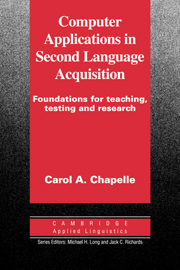Book contents
- Frontmatter
- Contents
- Series editors' preface
- Thanks
- Abbreviations
- 1 Historical foundations of CASLA
- 2 The context and challenge for CASLA
- 3 Computer-assisted language learning
- 4 Computer-assisted language testing
- 5 Computer-assisted SLA research
- 6 Directions for CASLA
- References
- Author index
- Subject index
Series editors' preface
Published online by Cambridge University Press: 05 October 2012
- Frontmatter
- Contents
- Series editors' preface
- Thanks
- Abbreviations
- 1 Historical foundations of CASLA
- 2 The context and challenge for CASLA
- 3 Computer-assisted language learning
- 4 Computer-assisted language testing
- 5 Computer-assisted SLA research
- 6 Directions for CASLA
- References
- Author index
- Subject index
Summary
Perhaps no single area of applied linguistics has seen such explosive growth over the past 15 years as computer-assisted instruction. Books and journal articles on the subject abound – indeed, new journals have appeared dedicated exclusively to it. Rapid developments in computer hardware and software are obviously a driving force, but so, too, is the increasing number of computer-literate people entering the field, whether as graduate students or language teachers.
Amidst all the excitement and innovation, however, a degree of healthy skepticism has survived in some quarters. Just how much of the work has produced genuine advances in language sciences? How much has really been a case of computer-buffs in search of a justification for their love of the technology, or worse, computer manufacturers in search of new markets for their products?
Carol Chapelle is a rare and valuable blend of enthusiast and skeptic. She is unquestionably one of the leading authorities on computer-assisted language instruction, and sees exceptional opportunities in computer-aided research for applied linguists. However, she is equally well known, and justfiably so, as an expert on second language acquisition, language teaching, and language testing, in each of which area she had published extensively before her work with computers in applied linguistics began, and in each of which she has continued to publish since. Her knowledge in those fields enables her to review research and practice involving the new technology fairly, but critically – to distinguish substantive contributions from commercial gimmickry.
Information
- Type
- Chapter
- Information
- Computer Applications in Second Language Acquisition , pp. xiii - xivPublisher: Cambridge University PressPrint publication year: 2001
